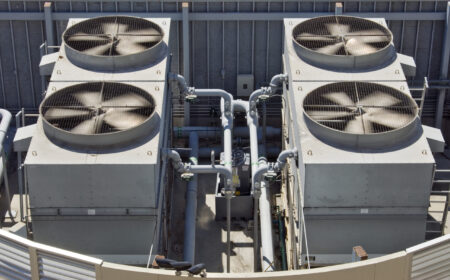
A commercial building should foster a productive and healthy work environment. One of the key players in this context is the heating, ventilation, and air conditioning (HVAC) system. It is responsible for providing a comfortable temperature and air quality inside a building, thus ensuring the well-being of its occupants. To ensure optimal performance throughout its life span, following a preventive maintenance routine is essential. Here’s what you need to know to keep your business’s HVAC system in good shape.
The Cost of Neglect
Financial and Operational Risks
The immediate impact of neglect is an increased risk of system breakdowns. Emergency repairs are often more expensive than regular maintenance, and unforeseen breakdowns can disrupt business operations, resulting in potential revenue loss. On top of that, neglected HVAC systems tend to operate less efficiently, which translates to higher utility bills. Over time, the cost of inefficient operation can far exceed the savings from skipping regular maintenance.
Hidden Costs
There are also hidden costs to consider. For example, poor indoor air quality due to an inadequately maintained HVAC system can lead to health issues among building occupants. This can result in increased absenteeism and decreased productivity, affecting the overall performance of your business.
Key Maintenance Tasks
Regular Inspections
Inspections entail evaluating the overall condition of the HVAC system, identifying signs of wear and tear, and making necessary adjustments to ensure peak performance. They generally cover all major components, such as the thermostat and electrical connections.
Cleaning Coils and Condensers
Dust and debris buildup can hinder the proper functioning of coils and condensers. Regular cleaning can prevent compressor failure and improve your system’s efficiency.
Lubricating Moving Parts
Regularly lubricating components such as motors, bearings, and fans ensures smooth operation and prolongs their life span. You’ll also notice a reduction in noise levels, which is a sign of efficient functioning.
Testing and Monitoring Refrigerant Levels
Refrigerant is the volatile liquid that cools the air in your HVAC system. It’s constantly turning from a liquid to a gas and back again to maintain a consistent temperature. As a result, refrigerant levels can fluctuate over time and may need to be adjusted or recharged. Regular testing and monitoring by a trained technician help ensure that your system uses the correct amount of refrigerant for optimal performance.
Thermostat Calibration
Your HVAC technician will check and calibrate your thermostat to ensure accurate temperature readings and efficient operation. They may recommend relocating it to a more suitable location if placement was also an issue.
System Performance and Efficiency Analysis
Finally, your HVAC technician can conduct a thorough analysis of your system’s performance and efficiency. They may use specialized tools such as airflow meters, pressure gauges, and infrared cameras to identify any areas that need improvement. Based on their findings, they will make recommendations for repairs or upgrades to optimize your system’s performance and save you money on energy bills.
Scheduling and Budgeting
Creating a Maintenance Schedule
Depending on the complexity and usage of your HVAC system, you may need to schedule maintenance tasks bimonthly, quarterly, or annually. Bimonthly tasks include checking refrigerant levels and inspecting electrical connections. Quarterly activities involve cleaning and inspecting coils, lubricating motors, and checking for leaks. Annual maintenance tasks typically include a complete system checkup, replacement of worn components, and calibration of thermostats. Consider working closely with a qualified HVAC technician to create a customized maintenance schedule that meets the specific needs of your system.
Budgeting for Maintenance
Budgeting for preventive maintenance involves allocating funds for routine inspections, filter replacements, cleaning, and any necessary repairs. Different contractors have varying rates. Just ensure that the one you pick fits your budget and offers quality services.
Monitoring and Adjusting
Regularly monitoring the performance of your HVAC system and adjusting the maintenance schedule as needed is crucial. Keep track of service records and maintenance activities to ensure that all tasks are performed on time. If you notice any recurring issues or changes in system performance, adjust your maintenance plan accordingly.
Contact Controlled Climate Services for More Information
Commercial HVAC maintenance is an ongoing process that requires a flexible approach. There’s no one-size-fits-all solution, and each property will have unique requirements. That’s why working with a professional maintenance provider who can offer customized solutions and ensure your HVAC system runs efficiently year-round is essential. If your commercial building is located in Kennesaw, GA, contact Controlled Climate Services for more information on our comprehensive HVAC maintenance services.
We also offer solutions for indoor air quality and AC and heat pump installations and expert guidance on selecting the best HVAC systems for commercial properties.
